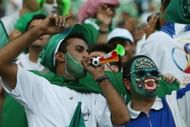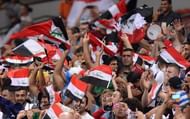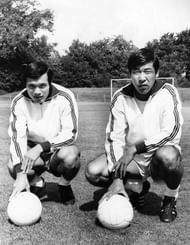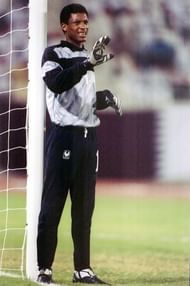
In modern times, it is not at all strange to see the best talents from Asia plying their trade in the European game. Players such as Shinji Kagawa and Heung-Min Son are drawn to Europe to test themselves against the best in the world.
That wasn’t always the case (and still isn't in some instances). In the past, many of Asia’s best spent their entire careers on their own continent, largely unknown to the outside world. Some, such as the powerful South Korean striker Cha Bum-Kun, named the best Asian player of the 20th century by the International Federation of Football History and Statistics (IFFHS), still made it to Europe, but it wasn’t the norm.
Here are five of the greatest Asians to have never played in Europe.
#1 Yasuhito Endo
The only 21st century player on this list, and the only currently active one also, Yasuhito Endo has become a hero at club and international level without ever leaving his native Japan.
A skilled passing midfielder, and wicked free-kick taker, he sat at the heart of the national team midfield for over a decade, as part of a side who qualified for three World Cups between 2006 and 2014, and won Asian Cup titles in 2004 and 2011.
He is Japan’s record caps holder, having made 152 appearances - 30 more than any other player.
At club level, Endo is a living legend at Gamba Osaka, for whom he has made over 500 appearances since joining from Kyoto Purple Sanga in 2001. An AFC Champions League triumph in 2008, followed by a third-place finish at that year’s Club World Cup, is the highlight of a strong list of honours.
The now 37-year-old was named Asian Footballer of the Year in 2009.
#2 Majed Ahmed Abdullah

The “Arabian Jewel,” Majed Ahmed Abdullah is one of the most prolific scorers in the history of Asian football. He scored 260 goals in 240 league appearances in his 20-year career with Al-Nassr and is still the Saudi Arabia national team’s top scorer, with 71 goals.
Abdullah’s list of personal and collective accolades is a long one. He was a three-time Asian Player of the Year and won numerous league and cup competitions with Al-Nassr, in addition to two Asian Cups with Saudi Arabia. The IFFHS named him third in their list of the best Asian player of the 20th century, while beIN Sports assigned him the title of Arabian Player of the Century.
The wider world didn’t get to see much of Abdullah, although he did get to enjoy Saudi Arabia’s first World Cup appearance in 1994, playing in the first half of their group stage matches against Belgium and the Netherlands as a 35-year-old nearing the end of his career.
A bumper crowd of 70,000 squeezed into the King Fahd Stadium in Riyadh to pay tribute to their hero in a match organised in his honour in 2008 - 10 years after his retirement.
#3 Ahmed Radhi

Ahmed Radhi was one from the unfortunate generation of Iraqi footballers who never had the opportunity to test themselves outside of their native country.
When Saddam Hussein’s son, Uday, became president of the Iraqi football association in the mid-eighties, he showed little inclination to allow the country’s best footballers to try their hand elsewhere. Their popularity proved a useful tool for the regime, and so promising players such as Radhi and Laith Hussein never got the opportunities their talent deserved.
Penarol of Uruguay made an offer to sign Radhi after he was named Asian Footballer of the Year in 1988, but it was rejected. And so one of the best Asian players of his generation, scorer of Iraq’s only World Cup goal in 1986, played out his career in Iraq, where he won five league titles and nine cup competitions with Al-Rasheed and Al-Zawraa.
#4 Kunishige Kamamoto

The 1960s and 1970s were not particularly productive decades for Japan as a footballing nation but the era did produce one outstanding star: Kunishige Kakamoto.
The Kyoto native made his club debut for Yanmar Diesel, his one and only team, in 1967 and a year later helped Japan’s Olympic Football Team to a surprise Bronze medal at the 1968 Summer Olympics in Mexico City. He was their standout performer, notching a hat-trick against Nigeria during the group stage and doubles in the quarter-final win over France and Bronze medal match against Mexico.
That did not, though, earn him a move to Europe. And so his career played out domestically in Japan, where he scored over 200 goals and was named Japanese player of the year on seven occasions. With the national team, he scored 80 goals - still the record to this day.
When the IFFHS compiled their ranking of the best Asian players of the 20th century, Kamamoto was present and correct at number five.
#5 Mohamed Al-Deayea

Probably the best goalkeeper Asia ever produced, Mohamed Al-Deayea spent his entire career in his native Saudi Arabia at the Al Ta’ee and Al-Hilal clubs.
The younger brother of Abdullah Al-Deayea, himself an accomplished custodian, Al-Deayea was the made between the sticks for the Saudi Arabia team who won the FIFA Under-17 World Cup in 1989 and then went on to make 178 appearances (some have the count at 181) for the senior national team - a recorded that stands to this day.
The Ha’il native was the starting goalkeeper as Saudi Arabia qualified for three consecutive World Cups between 1994 and 2002. He was even, at 34, part of the squad for the 2006 World Cup in Germany.
At club level, he won numerous domestic league and cup titles and also lifted the AFC Champions League trophy with Al-Hilal in 2000.
Rumours have it that at one point Al-Deayea was considered by Manchester United, only for a potential deal to fall through due to the difficulty of securing him a work permit. If true, that was to be his only, brief, flirtation with European football.
